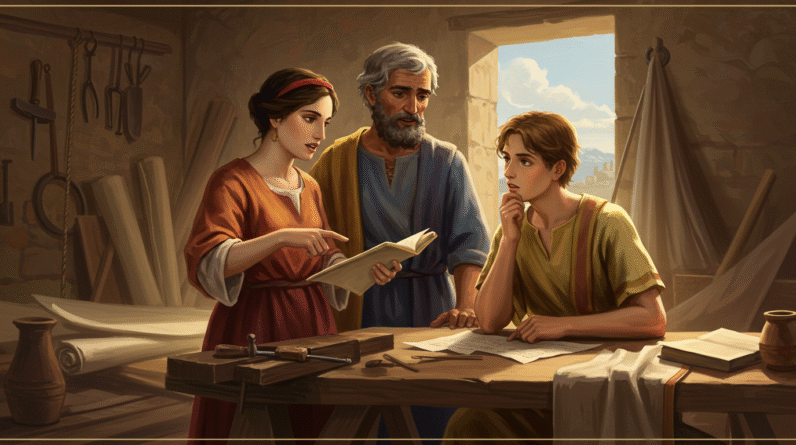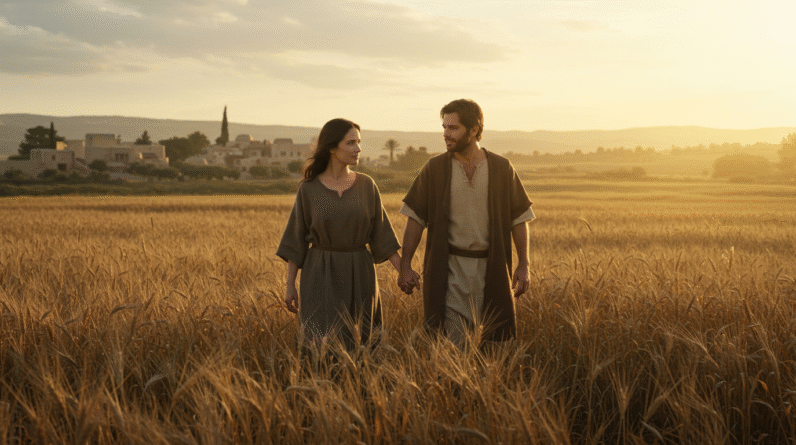10 Marriage Lessons From Adam And Eve
You probably know the basic story of Adam and Eve: God creates a suitable partner for Adam, they live in the Garden, and things change when they disobey. But if you look closely, the Genesis account contains a surprising number of foundational principles you can apply to your marriage today. In this article, you’ll explore ten marriage lessons from Adam and Eve that are practical, scriptural, and surprisingly relevant. Each lesson points back to the Genesis story and other biblical passages so you can see how these early moments shape what marriage is meant to be.
Before you read on, remember that “marriage lessons from Adam and Eve” doesn’t mean you’ll become a perfect spouse overnight. Instead, these lessons are an invitation to reflect, adjust, and aim for a relationship that’s deeper, more honest, and more resilient.
Biblical context: the Genesis account that shapes these lessons
To ground these marriage lessons from Adam and Eve, consider the actual scriptural narrative. Genesis 2 presents how God fashioned man and woman, called Eve a “helper,” and declared the two to become one flesh; Genesis 3 recounts the fall and its consequences. Reading these passages directly helps you see not just what happened, but why those events have been used for centuries to form foundational ideas about marriage. See the creation and the call to union in Genesis 2:18-25, and the fall with its aftermath in Genesis 3 (start reading Genesis 3:1 if you want the full chapter). With that in mind, let’s unpack ten practical marriage lessons from Adam and Eve.
1. You’re meant to be companions—complement, not clones
One of the clearest marriage lessons from Adam and Eve is the idea of companionship by design. God observes that it’s not good for the man to be alone and makes a partner to complement him. That word “helper” in the original text doesn’t mean inferior; it means suitable and complementary. When you see each other as companions rather than competitors, you move into a posture of mutual support.
Think about how complementarity plays out: you don’t have to be carbon copies of one another. Your strengths and weaknesses are part of a shared dynamic where each contributes something the other needs. In practical terms, this looks like dividing tasks in ways that make sense, encouraging each other’s gifts, and recognizing that difference can be a source of growth rather than conflict. The Genesis narrative shows this in the creation account—there’s intentionality in making a partner who fits. For a direct read on the creation and companionship language, see Genesis 2:18-25.
2. You’re invited into one-flesh unity—prioritize the relationship
One of the single most quoted verses on marriage comes from the creation story: “the two will become one flesh.” That language is more than poetic; it’s a marriage lesson from Adam and Eve that calls you to prioritize unity—emotionally, spiritually, and physically. The “one flesh” image describes an intimate bond in which two lives intersect and become deeply connected. You prioritize the marriage when you actively protect that intimate connection.
Prioritizing unity means creating rituals of togetherness: regular times to talk without distraction, shared decision-making, and protecting physical intimacy. It also means being willing to put the relationship above lesser priorities when necessary. Jesus references this foundational principle about joining two into one in his teaching, reinforcing the idea that marriage involves profound unity (Matthew 19:4-6). When you treat the marriage as a primary identity marker for your partnership, many day-to-day choices begin to align naturally with that commitment.
3. You’ll face temptation—practice honest communication and responsibility
The fall of Adam and Eve is a stark example of how temptation and miscommunication can damage a marriage. After the fruit is eaten, blame starts to circulate: Adam blames Eve, Eve blames the serpent. That pattern—shifting responsibility instead of owning mistakes—is one of the key marriage lessons from Adam and Eve. When temptation or poor choices happen (and they will), how you respond matters more than the choice itself.
If you’re tempted or you’ve made a mistake, the healthier path is to confess, take responsibility, and seek reconciliation. That breaks the blame cycle and opens the door to healing. The Genesis narrative, whose fault is instructive: Genesis 3:12-13 shows the immediate turning away from accountability. You can do differently. Practically, that looks like saying “I was wrong” without piling on excuses, listening when your spouse says how they’ve been hurt, and working together on preventative strategies to avoid similar issues.
4. You’ll deal with consequences—grace must be part of your marriage
Another hard lesson in the Adam and Eve story is that actions have consequences—physical, emotional, relational. After the fall, the relationship between humans and creation changes, and work and pain become realities (Genesis 3:17-19). That’s sobering, but also instructive: marriage will bring seasons of hardship not because God doesn’t care, but because life in a broken world includes struggle.
Your response to consequences is a marriage lesson from Adam and Eve: bring grace. Grace doesn’t ignore consequences; it acknowledges them and chooses to respond with forgiveness, patience, and mutual support. Give each other room to heal and learn. When you face financial strain, health issues, or unmet expectations, the posture of grace helps you move from blame to teamwork. Scripture also models grace inside redemptive frameworks—look to the New Testament for how grace reshapes human relationships. For a reminder about dealing with hardship in the human story, review the fall narrative at Genesis 3:16 and the curse on the ground in Genesis 3:17-19.
5. You need a partnership in work—share responsibilities
When God gives Adam tasks in the garden, he ultimately provides a partner so those tasks aren’t borne alone. One of the practical marriage lessons from Adam and Eve is that work is meant to be shared. Whether it’s household chores, parenting duties, or emotional labor, the burden is lighter and more sustainable when shared. Partnership in work fosters teamwork, prevents resentment, and honors the idea that both of you are “in this together.”
If you notice an imbalance, talk about it and redistribute responsibilities. Create systems that reflect both of your strengths and constraints. When work gets tough, remember the early scriptural image that partnership was part of the design: see the creation companionship in Genesis 2:18-25. Also, Ecclesiastes highlights the value of working together: “Two are better than one… if either of them falls, one can help the other up” (Ecclesiastes 4:9-12). You don’t have to (and shouldn’t) carry everything by yourself.

6. You’ll need to protect intimacy—physical and emotional fidelity matter
Adam and Eve teach you that intimacy is core to marriage. The “one flesh” concept includes sexual union and emotional closeness, both of which require intentional protection. Sexual intimacy is a unique expression of your covenant, and emotional intimacy is built through vulnerability, trust, and time together. Protecting both dimensions is a marriage lesson from Adam and Eve because the Genesis account establishes marriage as the primary relational context for that kind of union.
Protecting intimacy means setting boundaries with others, choosing transparency about struggles, and making time for real connection. It also includes honoring the biblical instruction about mutual sexual responsibility in marriage; for instance, Paul encourages couples to care for each other’s needs and to prioritize that intimacy (1 Corinthians 7:3-5). Intimacy can wither if it’s neglected, so treat it as something that needs cultivation. Practical steps include date nights, honest conversations about desires and disappointments, and seeking help if trust has been broken.
7. You’ll carry different burdens—cultivate empathy and care
You can see in the Genesis narrative and its consequences that men and women were affected differently by the fall—pain in childbirth and changing relational dynamics are part of that story (Genesis 3:16). One of the marriage lessons from Adam and Eve is to recognize that you and your spouse may carry different burdens at different seasons. Empathy becomes a powerful daily discipline in response.
Practically, empathy looks like listening deeply when your spouse shares a struggle, not defaulting to quick fixes or minimizing their feelings. It means acknowledging different emotional rhythms and physical realities. When one partner is weary—emotionally, spiritually, or physically—the other can offer support, rest, and practical help. That kind of mutual care rebuilds intimacy and trust. You can also turn to Scripture for the ethic of mutual care; look at the apostle Paul’s instruction about mutual submission and sacrificial love in marriage in Ephesians 5:22-33 as a broader theological framework for empathy and care.
8. You’ll need to guard speech—words have consequences
After the fall, the immediate reaction is to dodge responsibility through speech—Adam blames Eve, Eve blames the serpent. The lesson here is glaring: your words in marriage matter. They can wound, shift blame, or build up; they can also open or close pathways to reconciliation. Guarding your speech is one of the marriage lessons from Adam and Eve that you’ll want to practice daily.
In your marriage, practice speaking with honesty and humility. Instead of launching into accusations, describe your experience and feelings, and invite dialogue. If something hurts you, say so calmly and seek to understand the other person. If you’re the one at fault, a brief, sincere confession avoids the poison of blame and will likely accelerate healing. The Genesis episode in which blame is passed around is a useful cautionary example—see Genesis 3:12-13 for how quickly speech can escalate dysfunction. Choose words that create safety and openness rather than defensiveness.
9. You’ll need covenantal commitment—marriage is intentional and sacred
One of the deepest marriage lessons from Adam and Eve is the covenantal nature of marriage. The creation account frames the relationship as an intentional union created by God—two becoming one flesh, set apart from other relationships. That sacredness means your commitment is not merely a feeling; it’s a covenant decision to stay, to love, and to work through difficulties together.
Treating marriage as a covenant affects how you respond in crises. Instead of defaulting to exit strategies when things get difficult, you’re invited to seek reconciliation, to restore trust, and to pursue growth together. Jesus’ teaching on marriage underscores the permanence and seriousness of that bond (Matthew 19:4-6). Covenantal commitment doesn’t mean you ignore abuse or harm—safety matters—but it does mean you recognize the weight of your promises and the power of choosing to keep them.
10. You’ll need faith and hope—see marriage as part of a bigger story
Finally, one of the more hopeful marriage lessons from Adam and Eve is that your marriage is part of a bigger redemptive story. The Genesis account sets the stage for human relationships within the larger narrative of God’s purposes. When you view your marriage through that lens, you’re not only dealing with daily issues; you’re participating in a story of restoration, grace, and transformation.
Faith and hope help you through seasons when everything feels hard. You can pray together, study Scripture, and participate in a community that encourages your marriage. The New Testament repeatedly points to marriage as a picture of a fuller spiritual reality—Ephesians frames marital love as reflecting Christ’s love for the church (Ephesians 5:22-33). When you anchor your marriage in faith, you draw on resources bigger than your immediate abilities. That doesn’t remove the need for practical growth, counseling, or hard work, but it does infuse your marriage with meaning and hope.
How to put these marriage lessons from Adam and Eve into practice
You’ve explored ten marriage lessons from Adam and Eve—now the important part: applying them. Practical action turns lessons into lasting habits. Start small and build consistency. Here are a few concrete steps you can take to live out what you’ve learned:
- Commit to weekly check-ins where you talk honestly about needs and expectations.
- Practice owning mistakes quickly; a simple “I was wrong” is often more healing than hours of justification.
- Divide responsibilities intentionally and revisit them when life changes.
- Protect intimacy through regular, distraction-free time together.
- Seek help—mentors, counselors, or trusted community—when you hit persistent relational roadblocks.
- Cultivate spiritual practices together—prayer, Scripture reading, worship—that remind you of the covenant nature of marriage.
These practical moves help you embody the marriage lessons from Adam and Eve. Don’t expect instant perfection. Growth in marriage is a marathon of small, faithful steps.
Where Scripture continues to guide marriage beyond Genesis
If the Genesis narrative is the starting point for these marriage lessons from Adam and Eve, other Scriptures help you refine and live them out. Ephesians 5 gives robust teaching on sacrificial love and mutual respect (Ephesians 5:22-33). 1 Corinthians provides practical guidance on mutual care in the physical aspects of marriage (1 Corinthians 7:3-5). Ecclesiastes reminds you that two are better than one when the going gets tough (Ecclesiastes 4:9-12). Scripture gives you both the blueprint and the resources to live out these lessons in real-world ways.
If you want to dig deeper into the covenantal and relational theology of marriage, read passages like Proverbs 18:22 (the value of finding a spouse), Hebrews 13:4 (honoring marriage), and the poetic celebration of love in the Song of Solomon (Song of Solomon 8:6-7). These passages, together with the Genesis narrative, shape a robust theological and practical framework you can bring into your daily life.
Final encouragement: marriage is a journey, not a destination
As you reflect on these marriage lessons from Adam and Eve, remember that marriage is ongoing work. The Genesis account gives you patterns, warnings, and hope. You’ll experience highs and lows, but the same story that shows brokenness also points to restoration and purpose. When you treat your marriage as a covenant that calls for compassion, responsibility, and teamwork, you’ll find that even difficult seasons can become growth opportunities.
Be patient with each other, invest time and attention in the relationship, and stay open to change. Lean on community and Scripture when you need help, and don’t be afraid to seek professional counseling if patterns become entrenched. The lessons from Adam and Eve are not magic formulas; they’re invitations to build a marriage that’s resilient, loving, and rooted in shared commitment.
Explore More
For further reading and encouragement, check out these posts:
👉 7 Bible Verses About Faith in Hard Times
👉 Job’s Faith: What We Can Learn From His Trials
👉 How To Trust God When Everything Falls Apart
👉 Why God Allows Suffering – A Biblical Perspective
👉 Faith Over Fear: How To Stand Strong In Uncertain Seasons
👉 How To Encourage Someone Struggling With Their Faith
👉 5 Prayers for Strength When You’re Feeling Weak

📘 Jesus and the Woman Caught in Adultery – Grace and Mercy Over Judgement
A powerful retelling of John 8:1-11. This book brings to life the depth of forgiveness, mercy, and God’s unwavering love.
👉 Check it now on Amazon 🛒💥
🔥 “Every great message deserves a home online.” 🌍💬🏡
Don’t let your calling stay hidden. Start a Christian blog or website using Hostinger — with 99.9% uptime, a free domain, and SSL, your voice can shine for God’s glory anytime, anywhere.
💥 Begin today. 🛒 Try it RISK-FREE! ✅
✝️ “Your body is God’s temple — care for it with purpose.” 💪💖🏛️
Renew your energy and restore balance naturally. Mitolyn helps support a healthy metabolism, giving you the vitality to live out God’s calling with strength and confidence.
🔥 Unlock Your Metabolic Power! ⚡Burn More Calories & Feel Great With Mitolyn. 💪
👉 Start Today. 🚀 Check Price Now. 🛒💰
💰 As a ClickBank & Amazon Affiliate, I earn from qualifying purchases.
📖 Acknowledgment: All Bible verses referenced in this article were accessed via Bible Gateway (or Bible Hub).
🚀 Want to explore more? 👉 Dive into our new post on Why Jesus? and experience the 🔥 life-changing truth of the Gospel!








